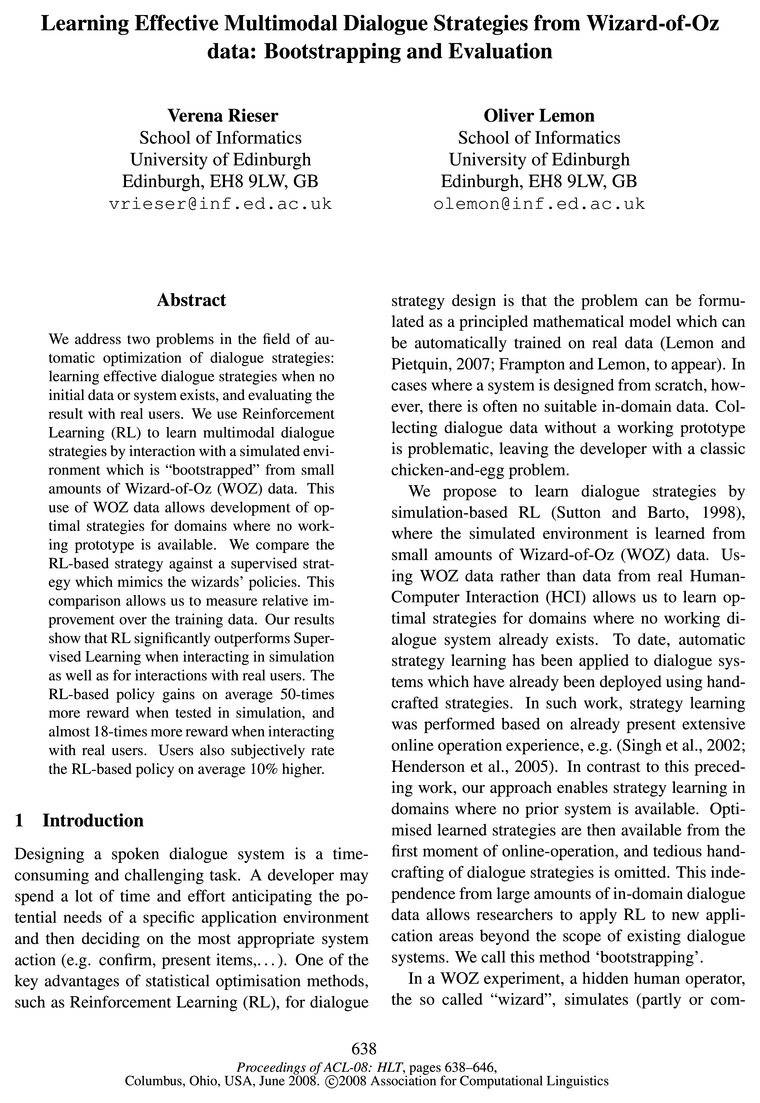Article Structure
Abstract
We address two problems in the field of automatic optimization of dialogue strategies: learning effective dialogue strategies when no initial data or system exists, and evaluating the result with real users.
Introduction
Designing a spoken dialogue system is a time-consuming and challenging task.
Wizard-of-Oz data collection
Our domains of interest are information-seeking dialogues, for example a multimodal in-car interface to a large database of music (MP3) files.
Simulated Learning Environment
Simulation-based RL (also know as “model-free” RL) learns by interaction with a simulated environment.
User Tests
4.1 Experimental design
Comparison of Results
We finally test whether the results obtained in simulation transfer to tests with real users, following (Lemon et al., 2006a).
Conclusion
We addressed two problems in the field of automatic optimization of dialogue strategies: learning effective dialogue strategies when no initial data or system exists, and evaluating the result with real users.
Topics
significantly improved
- Table 1: Predicted accuracy for presentation timing and modality (with standard deviation i), * denotes statistically significant improvement at p < .05Page 4, “Simulated Learning Environment”
- For presentation timing, none of the classifiers produces significantly improved results.Page 4, “Simulated Learning Environment”
- data show significantly improved Task Ease, better presentation timing, more agreeable verbal and multimodal presentation, and that more users would use the RL-based system in the future (Future Use).Page 7, “User Tests”
- The results show that only the RL strategy leads to significantly improved user ratings (increasing average Task Ease by 49% and Future Use by 19%), whereas the ratings for the SL policy are not significantly better than those for the WOZ data, see Table 3.Page 8, “Comparison of Results”
See all papers in Proc. ACL 2008 that mention significantly improved.
See all papers in Proc. ACL that mention significantly improved.
Back to top.
significantly outperform
- Our results show that RL significantly outperforms Supervised Learning when interacting in simulation as well as for interactions with real users.Page 1, “Abstract”
- For learning presentation modality, both classifiers significantly outperform the baseline.Page 4, “Simulated Learning Environment”
- The results show that simulation-based RL with an environment bootstrapped from WOZ data allows learning of robust strategies which significantly outperform the strategies contained in the initial data set.Page 6, “Simulated Learning Environment”
- Our results show that RL significantly outperforms SL in simulation as well as in interactions with real users.Page 8, “Conclusion”
See all papers in Proc. ACL 2008 that mention significantly outperform.
See all papers in Proc. ACL that mention significantly outperform.
Back to top.

